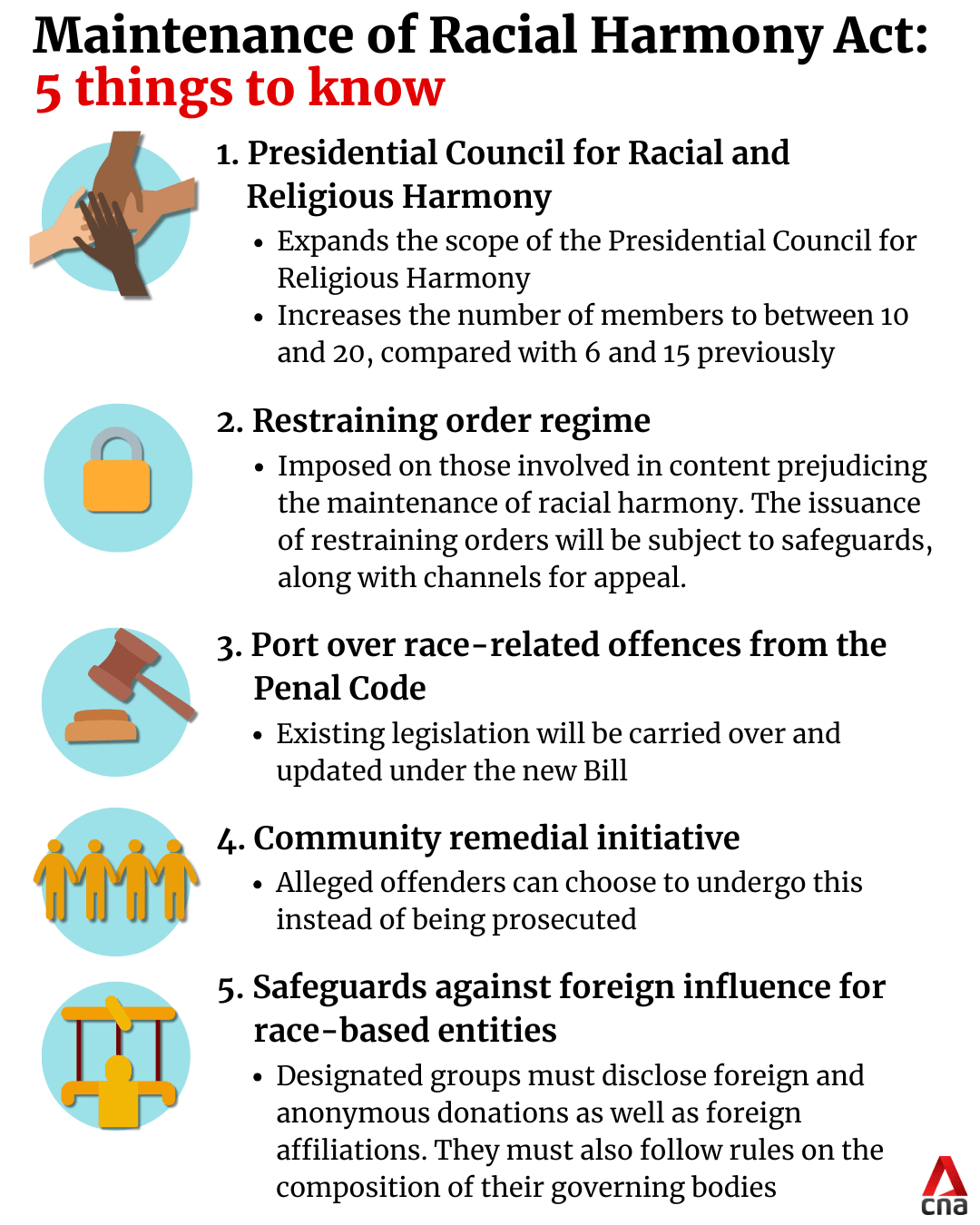'An additional layer of check': Shanmugam, opposition MPs debate president's powers in new racial harmony Act
The president will have the authority to confirm, cancel, or vary a restraining order in cases where the Cabinet’s advice is different from the Presidential Council’s recommendation.

Opposition Members of Parliament Sylvia Lim (left) and Leong Mun Wai (right) debated the merits of the updated presidential powers with Law and Home Affairs Minister K Shanmugam (centre) in parliament on Feb 4, 2025.

This audio is generated by an AI tool.
SINGAPORE: The president's role in the new Maintenance of Racial Harmony Act was debated in parliament on Tuesday (Feb 4), with an opposition Member of Parliament (MP) saying that the president should not be in a position to potentially disagree with the government on matters of race.
The Bill was passed unanimously, but the accompanying constitutional amendment updating the president's powers saw seven Workers’ Party MPs vote against it. The remaining 78 MPs voted in favour of it.
Under the new Act, the Minister for Home Affairs will be able to issue restraining orders against people involved in the communication, production or distribution of content that prejudices the maintenance of racial harmony in Singapore.
The Act will establish a Presidential Council for Racial and Religious Harmony that can process appeals from people issued a restraining order, and can send an independent recommendation to the president.
Among other powers, an accompanying constitutional amendment will give the president the authority to confirm, cancel, or vary a restraining order in cases where the Cabinet’s advice is different from the Presidential Council’s recommendation.

ARGUMENTS AGAINST UPDATED PRESIDENTIAL POWERS
The responsibility of maintaining racial harmony, law and order, should lie with the government and not the president, said MP Sylvia Lim (WP-Aljunied).
“While all of us have a part to play, the government is responsible for this outcome. It is publicly accountable for this key performance indicator to Singaporeans, through parliament,” the WP chair said.
“It is not the elected president’s responsibility to maintain public peace and public order. He is not answerable to parliament in any way.”
The proposed mechanism for the president to review the minister’s orders carries “several significant risks”, she added.
For instance, should the president unjustifiably cancel a restraining order, and the organisation concerned turns out to be a proxy for a foreign hostile actor, the government can say that it had issued the correct decision and “is not to be blamed for bad outcomes”.
She added that the president is a symbol of unity and the personification of the state.
“To require him to make hard decisions on matters involving ethnicity will detract from his role as a unifying figure above politics.”
In his round-up speech, Minister for Law and Home Affairs K Shanmugam said that Ms Lim’s concerns about the president’s updated powers are “ultimately a question of judgment”.
“The government's view is that parliament and the public are essential checks on the minister's power, but that there is also considerable value in having an additional layer of check through the Presidential Council and the president,” he said.
“It is appropriate for the president, who is directly elected by the people, to act as a check on this power that can be exercised by the minister.”
He added that this is similar to the model that Singapore has adopted for other legislation, such as the Internal Security Act and the Maintenance of Religious Harmony Act.
Responding to Mr Shanmugam, Ms Lim said that there could be a scenario where the president will disagree with a minister because the Presidential Council has disagreed as well.
Therefore, the president is entitled not to follow the Cabinet's decision and could cancel the restraining order issued by the minister.
She asked: “So if that were to happen, does the minister not agree that such a confrontation with the government by the elected president really detracts from his role?”
She added: “This scheme here will risk the elected president being polarised along racial lines, and it is actually really not a road that we want to go down.”
Responding to Ms Lim, Mr Shanmugam said that if the Presidential Council consists of people such as senior community leaders and leaders of religious groups, they can advise the president if they believe the government's restraining order lacks substance.
He added: “It's a curious reversal of roles, because I am here arguing for an extra layer of check on the government, whereas Ms Lim is saying, ‘Why are we having this additional layer?’”
HOW THE NEW ACT IS DIFFERENT FROM FICA
In an extended exchange, Progress Singapore Party’s (PSP) Non-Constituency Member of Parliament Leong Mun Wai asked why the president has no discretion over decisions made under the Foreign Interference (Countermeasures) Act (FICA), which aims to prevent foreign interference in domestic politics.
Mr Shanmugam explained that the FICA would require the government to act often on intelligence on foreign influence, and often that information is “not something that we can share with third parties”.
“It would be a serious prejudice to national interest if we were to go out and disclose to anyone beyond a very small group of intelligence officers the nature of this information,” said Mr Shanmugam.
He added: “In the context of someone talking about race, there is nothing particularly related to intelligence, because it's public – the person has said what he has said.
"Now it's a question of assessment, if something ought to be done about it."
He also warned members of the house not to “unduly alarm the public” with their speeches in parliament.
“I know sometimes speeches are made really with the purpose of the public in mind … but it's sometimes made tailored for putting out in social media,” he said.
He added that all members would agree that they do not want the public to be misled.
“So I would suggest that if speeches are put out which could be misleading on their own, then some care should be taken to give the correct impression of the debate under the parliamentary proceedings Act and the correct impression of the Bill as clarified by me,” he said.
The genius of Singapore has been to create one united people from those of many races, religions and languages without erasing multiplicity, said Home Affairs and Law Minister K Shanmugam in Parliament on Tuesday (Feb 4). He explained that the country’s approach towards maintaining racial harmony has been two-fold - establishing a strong legal framework that sets clear boundaries on what is not allowed, coupled with deliberate Government policies to facilitate social mixing and strengthen cohesion. This has led to understanding, acceptance and deep bonds across racial and religious lines even as race relations have regressed in many other countries, Mr Shanmugam said. He spoke during the second reading of a Bill that aims to consolidate and strengthen the Government’s powers to maintain racial harmony. Its proposals include introducing an initiative that allows offenders to mend ties with the community they attacked instead of being charged in court as well as safeguards against foreign influence through race-based entities.
















